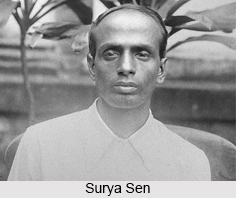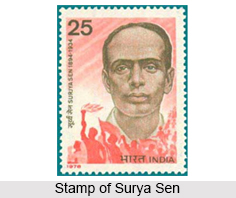 Surya Sen was an Indian revolutionary who masterminded the daring Chittagong Armoury Raid. He as a revolutionary took part in Non Cooperation Movement. Surya Sen was a teacher by profession and was popularly known as "Master Da". Surya Sen, a brilliant and inspiring organizer, was an unpretentious, soft spoken and transparently sincere person. He was fond of saying: “Humanism is a special virtue of a revolutionaryâ€. He was a great admirer of Rabindranath Tagore and Kazi Nazrul Islam.
Surya Sen was an Indian revolutionary who masterminded the daring Chittagong Armoury Raid. He as a revolutionary took part in Non Cooperation Movement. Surya Sen was a teacher by profession and was popularly known as "Master Da". Surya Sen, a brilliant and inspiring organizer, was an unpretentious, soft spoken and transparently sincere person. He was fond of saying: “Humanism is a special virtue of a revolutionaryâ€. He was a great admirer of Rabindranath Tagore and Kazi Nazrul Islam.
Early Life of Surya Sen
Surya Sen was born on 18 October 1893 in Chittagong. One of his teachers had initiated in him the revolutionary ideas in the year 1916 when he was studying B.A. in Behrampore College. Thereafter he joined the revolutionary group "Anushilan".
Career of Surya Sen
In 1918, Surya Sen became a teacher of the National School in Nandankanan and later joined the Umatara School at Chandanpura. In 1918, he became the president of the Chittagong district committee of the Indian National Congress.
 Surya Sen in Indian Freedom Struggle Movement
Surya Sen in Indian Freedom Struggle Movement
Surya Sen was known for recruiting a group of young and passionate revolutionaries known as the Chittagong group including Anant Singh, Ganesh Ghosh and Lokenath Baul, who fought against the British stationed in Chittagong. He was an active participant in the Non-Cooperation Movement and was later arrested and imprisoned for 2 years from 1926 to 1928 for his revolutionary activities.
Chittagong Armoury Raid by Surya Sen
Surya Sen initiated a secret warfare against the colonial Government. He led a group of revolutionaries to raid the armoury of police and auxiliary forces from the Chittagong armoury. The plan was elaborate and included seizing of arms from the armoury as well as destruction of communication system of the city, thereby isolating Chittagong from the rest of British India. The Chittagong Armoury Raid that was done on April 18, 1930 was his major success. Thereafter, he marched to Jalalabad Hills along with his fellow revolutionaries and post battle with the British troops, he escaped from there.
After the Chittagong raid in 1930, a fierce battle took place where over 80 British troops and 12 revolutionaries were killed. Surya Sen and other surviving revolutionaries dispersed into small groups and hid in neighbouring villages, launching raids on government personnel and property. Surya Sen was always hiding as he was being constantly followed up by the police. He had to shift from one place to another due to this. Netra Sen had informed the British about Surya Sen. Either because of money, or out of jealousy, or because of both, Netra Sen told the British Government that Surya Sen was at his house. As a result, the police came and captured him on February 16, 1933.
Death of Surya Sen
Surya Sen was hanged along with Tarakeshwar Dastidar on January 12, 1934. He was brutally tortured before being hanged.
A commemorative stamp was released on him in 1977 by the Government of India.




















